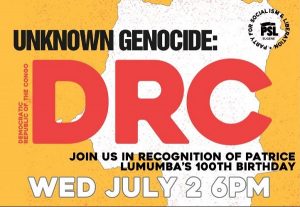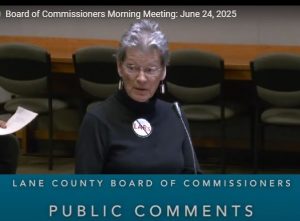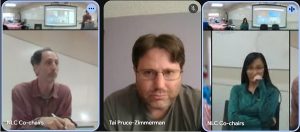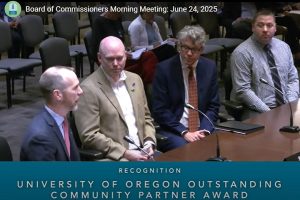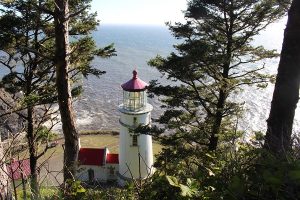Duma housing co-op founders build on 30 years of learning
6 min read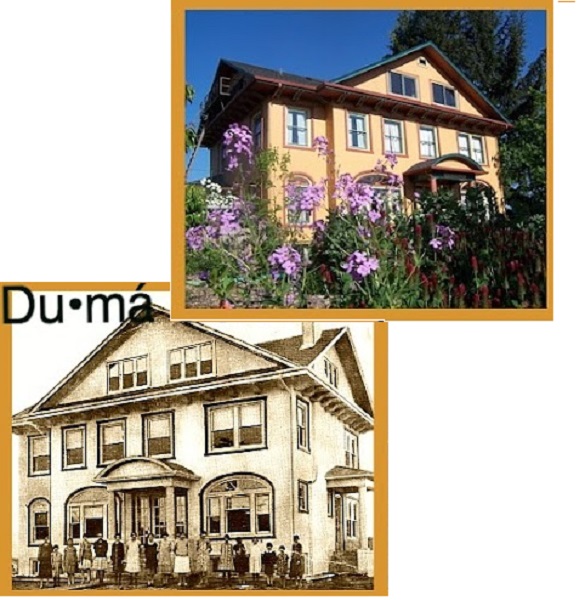
Allen Hancock brings 30 years of co-housing learning from Alder Street to Duma West.
by Todd Boyle
On Saturday, February 12th, the Duma Housing Co-op announced the launch of its second site. The Duma Housing Co-op is located on Alder Street and it’s been operating for 30 years. The second site will be located at 547 West 12th. Here’s Allen Hancock.
[00:00:22] Allen Hancock: Thank you all for coming. It’s really exciting to see so many people here.
[00:00:27] A lot of you, I already know some of you I live with or have lived with. Um, and a few months ago, I would have never guessed that I would be sitting on this front porch talking about this, this house. And, um, so if you haven’t gotten a chance to tour the house, you can do that afterwards.
[00:00:48] So I wanted to start a little bit for those of you who don’t know me. My name is Allen and I moved to Eugene in the late 1980s to go to graduate school. And I was looking for housing like everyone else. And I found myself in the student cooperatives, the Janet Smith house, and it blew my world. I was just, I loved it. I absolutely loved living there. I became the president of the Student Cooperative Association and I put a lot of time and energy into it, but I realized like I’m going to be a student forever. And I didn’t really necessarily want to live with like 30 people that are constantly changing every, you know, three or six months. Like that wasn’t my thing. But I like how, how can we make something that includes people of different ages and different perspectives and different walks of life?
[00:01:37] And so I got together with a lot of other people and the short story is we bought a house. We bought a house on Alder Street and we put a lot of time and energy into that house as you’ll see by those photos. And the reason why I posted those photos is so you can see that this house looks a lot like that house did 30 years ago.
[00:02:02] When I first walked in here, I was like, oh yeah, I remember what this was like when I first walked into the house on Alder Street. So the long story short is that a number of people were co-owners and some people were renters and that house over the many, many years, and then Lawrence…? Lawrence here, there’s Lawrence right there in the chair.
[00:02:27] Lawrence was the last person who was a co-owner up until 2010. And at that point in time, I kind of scratched my head and I said, well, You know, this has been a collective for a long time, maybe I should try something different. And so I did do something different and I took that on as my full responsibility as an, as a way of constantly adapting and learning from circumstances of what worked and what didn’t work, because there were a lot of things that didn’t work about the arrangements that, that we had.
[00:03:01] But I should say from the beginning that our purpose of the Duma Community has been to demonstrate to me. How to live more with a smaller footprint and how to create connections and how to create community. And that that’s been a learning process the whole time. Um, you know, I continue to learn about that process myself.
[00:03:24] And, um, after the many years of living in community, I thought, you know, I want to be able to share this with more people and the problems that we faced in the 1980s are even more pronounced today. I mean, we barely talked about climate change in 1989; it’s certainly for front and center right now. And we you know, isolation was a thing in the eighties, but after COVID, you know, a lot of people are really struggling and wanting community and wanting connection and housing was not very affordable.
[00:04:06] So for all those reasons, when I rode by this house in early November and saw the ‘For Sale’ sign, I thought to myself, wow, this house has a lot going for it. Had similar kind of criteria back in the day when Katya and others, when we were looking for a place to have as a collective, and that was a house that could have between six and 10 people live in it, because that’s kind of a sweet spot between diversity and intimacy. And we were looking for a location that was close enough to downtown that you could ride your bike or walk and didn’t have to own a car. And we were looking for a place that had garden space.
[00:04:54] And probably more than anything looking back on it, I don’t know how important it was to us then, but it had to have soul. You know, just a box unit would not work and this place has got soul. It’s got, it’s got some character and I, I love to learn more about that.
[00:05:14] A little bit about my intentions for this, this place. A lot of it is still unfolding. I don’t really know, but what I can say is that it’s going to take a while to get there. And for right now, um, I’m intending to kind of keep it in the same configuration that it has been for, I guess, 30, 40 or more years, which is divided up into separate units, separate apartments. Um, probably because there’s a lot of work that needs to be done. And that’s just going to take some time to get that done.
[00:05:44] But also because I want to coalesce a group of people who are interested in living here for a period of time, for a longer period of time and who really want to make this their home. And one of the things that I have witnessed both at the Duma Community and out when I travel about and visit other shared households, is that they tend to be kind of ephemeral.
[00:06:10] You know, it’s not uncommon for people to rent a house together for a few years, and then it all kind of, you know, people move on to different places and all of that collective energy sort of dissipates. Or maybe the person who owns the house decides to sell it and everyone’s, like, really bummed because they had something really good going on.
[00:06:30] So if we want to increase density and if we want longevity, if we want to create a better future, if we want to fulfill obligations for the people who are coming after us, then I think it’s important to think about how do we do things differently so that people can live together and gain all those benefits of living together and have it sustain itself. Have the people who can stay there for years and not think like, ‘I’m looking forward to something else,’ but more thinking like, ‘Why would I want anything else?’
[00:07:05] And so I have a lot of thoughts about that after 30 years and what I’m hoping to do when I coalesce a group of people is to give some presentations and workshops. And to test some ideas out, some ideas that I haven’t heard anyone else talk about. And, um, I’m eager to bounce those ideas off of people and to see what their reaction is and what they, what they learn from it and what I can learn from that. And I’m hopeful that in that conversation, in those learnings, that that will help plant the seed for people to be able to thrive together in a way that some other experiments haven’t been able to achieve.
[00:07:48] Todd Boyle: This has been brought to you by Todd Boyle for the KEPW Newswire.
